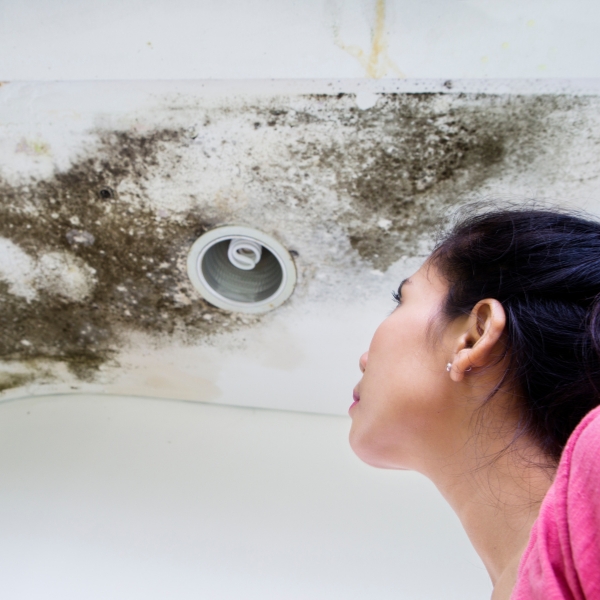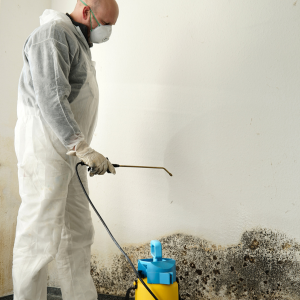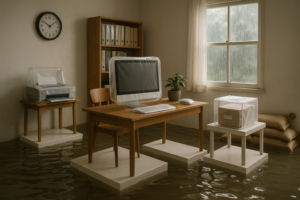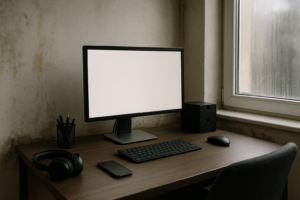Mold is more than just an unsightly nuisance—it’s a major threat to Austin businesses. Whether you run a restaurant on South Congress, a boutique in East Austin, a tech startup downtown, or a warehouse in Round Rock, mold growth can shut down business operations, endanger employees, and even lead to lawsuits.
Austin’s humid climate and frequent storms make commercial buildings particularly vulnerable to mold issues. From summer downpours to burst pipes during a winter freeze, businesses need to stay vigilant to protect their property and customers.
In this article, we’ll explore:
–The risks mold presents to businesses in Austin
–Warning signs of mold in a commercial space
–The financial impact of a mold-related business shutdown
–Prevention strategies tailored to Austin’s climate
–What to do if mold threatens your business operations
Stay informed and act now to avoid an unexpected mold disaster that could cost your company time, money, and its reputation.
How Mold Can Shut Down Business Operations: The Hidden Dangers

Unchecked mold growth can have severe consequences for any business. Here’s how it can bring operations to a screeching halt:
1. Health Hazards: Employee & Customer Safety Risks
Mold exposure can cause serious health issues, leading to sick employees and unhappy customers. Common symptoms include:
- Respiratory issues (coughing, wheezing, difficulty breathing)
- Headaches and fatigue
- Skin irritation or rashes
- Sinus congestion and allergic reactions
In a city like Austin, where seasonal allergies are already a problem, mold can make symptoms even worse. If employees start reporting frequent health complaints, mold could be the cause—leading to absenteeism, reduced productivity, and even workers’ compensation claims.
2. Regulatory Violations & Forced Closures
Austin businesses must comply with OSHA regulations and Travis County health codes, which require a safe work environment. Failure to address mold issues can result in:
- Hefty fines for workplace safety violations
- Failed health inspections
- Temporary or permanent closure by city officials
Industries such as restaurants, hotels, childcare centers, and healthcare facilities are particularly at risk. If mold contamination is found, the Austin Health Department can shut down business immediately until the issue is resolved.
3. Property Damage: Structural Issues & Inventory Loss
Mold feeds on organic materials such as wood, drywall, and carpet, leading to serious structural damage. If left unchecked, mold can:
- Weaken walls, ceilings, and floors
- Destroy inventory, documents, and equipment
- Contaminate HVAC systems, spreading mold spores throughout the building
The longer mold is ignored, the higher the cost of repairs and remediation.
Warning Signs: Is Your Austin Business at Risk?
Recognizing early warning signs of mold can save your business from disaster. Look out for:
Common Indicators of Mold in Austin Businesses
- Visible mold growth – Black, green, or white patches on walls, ceilings, or floors
- Persistent musty odors – A damp, earthy smell that lingers
- Water stains or past flooding – Unaddressed leaks and water damage lead to mold
- Increased employee allergies – Frequent sneezing, itchy eyes, or breathing issues in the workspace
- Peeling paint or warped surfaces – Signs of excess moisture buildup
High-Risk Industries for Mold Growth in Austin
Austin’s humid weather makes the following businesses particularly vulnerable:
Restaurants & Cafés – Kitchens and walk-in coolers create high humidity
Hotels & Vacation Rentals – Guest bathrooms, pool areas, and HVAC systems can harbor mold
Warehouses & Storage Facilities – Poor ventilation and storm-related leaks can damage inventory
Gyms & Yoga Studios – Locker rooms and steam areas provide the perfect mold breeding ground
Medical & Dental Offices – Mold can pose serious health risks for patients and staff
If your business falls into these categories, schedule regular mold inspections to protect your investment.
Financial Fallout: The Cost of a Mold Shutdown in Austin

A mold outbreak can be financially devastating for business owners. Here’s what you need to prepare for:
1. Expensive Mold Remediation
Professional mold removal in Austin can range from $3,000 to $30,000 or more, depending on the severity.
2. Revenue Loss Due to Shutdowns
A business shutdown means halted operations, lost customers, and decreased profits. For local Austin restaurants and retailers, even a few days of closure can result in tens of thousands of dollars in lost revenue.
3. Legal Liability & Lawsuits
- Employee health claims – Workers may sue for unsafe conditions.
- Customer complaints – If guests or customers become sick, they can file legal action.
- Lease & landlord disputes – Mold-related damages can lead to conflicts with property owners.
Being proactive can save your business thousands and protect your reputation.
Prevention Strategies: Protect Your Austin Business From Mold
To avoid a mold-related disaster, follow these proven prevention strategies:
1. Control Moisture & Humidity
–Fix leaks immediately – Roof leaks, plumbing issues, and HVAC failures can lead to mold.
–Monitor indoor humidity – Keep levels between 30-50% with dehumidifiers.
–Improve ventilation – Ensure proper airflow in basements, kitchens, and storage rooms.
2. Schedule Regular Mold Inspections
Hire a local Austin mold inspection company to detect problems early before they become costly.
3. Train Employees to Spot Mold
Educate your staff to recognize and report mold issues before they spread.
What to Do If Mold Threatens to Shut Down Your Business
If you discover mold in your business, act fast:
Step 1: Isolate the Affected Area – Prevent Mold Spores from Spreading
Mold spreads quickly through airborne spores, especially in businesses with HVAC systems that circulate air throughout the building. The first step in containment is to limit access and stop mold from traveling to unaffected areas.
How to properly isolate mold in your business:
- Close off the area – Restrict employee and customer access to prevent exposure.
- Turn off HVAC systems – Air vents can spread mold spores throughout the building.
- Seal doors and windows – Use plastic sheeting or tarps to block off contaminated areas.
- Use air scrubbers or HEPA filters – These devices help capture mold spores before they spread further.
- Relocate inventory and equipment (if possible) – If you have valuable items or products in the affected area, move them to a dry, well-ventilated location.
Step 2: Call an Austin Mold Remediation Expert – DIY Mold Removal Can Make the Problem Worse
While it might be tempting to handle mold removal yourself, improper cleaning can spread mold spores further, worsen contamination, and even violate OSHA safety standards.
Why professional mold remediation is necessary:
- Thorough mold assessment – Professionals use infrared cameras and air quality testing to detect hidden mold behind walls and ceilings.
- Safe removal techniques – Certified experts follow industry-approved methods to remove mold without cross-contaminating other areas.
- Commercial-grade treatments – DIY mold sprays don’t always work. Remediation experts use industrial-strength antimicrobial treatments to eliminate mold at its source.
- Compliance with Austin’s health regulations – Mold in restaurants, hotels, medical facilities, and childcare centers requires expert handling to avoid business closure by local authorities.
Step 3: Document Everything – Keep Records for Legal and Insurance Purposes
Proper documentation is critical to protect your business legally, file insurance claims, and ensure compliance with OSHA and health department regulations.
- Take photos and videos – Capture mold growth, water damage, and affected areas before remediation begins.
- Keep detailed records – Log all employee reports, maintenance requests, and remediation steps taken.
- Obtain a professional mold assessment report – This report can serve as evidence if you face legal claims or need proof of remediation for regulatory compliance.
- Check your commercial insurance policy – Some policies cover mold damage, but only if you take immediate action to remediate it.
Pro Tip: If a customer or employee files a complaint or lawsuit due to mold-related illness, your documentation can prove you took prompt and responsible action, helping you avoid hefty fines or legal repercussions.
Take Action Now: Protect Your Austin Business from Mold
Don’t wait until mold threatens your business and revenue. Be proactive by scheduling a professional mold inspection today!
Why Choose a Local Austin Mold Specialist?
–Expertise in Austin’s unique climate and humidity challenges
–Fast response times for emergency mold removal
–Knowledge of local business health regulations
–Comprehensive inspections with certified testing
Get a Free Mold Assessment for Your Business
Schedule an appointment today and protect your business from unexpected closures and costly remediation!
Call Now: (737) 358-0963
Get a Free Quote Here







